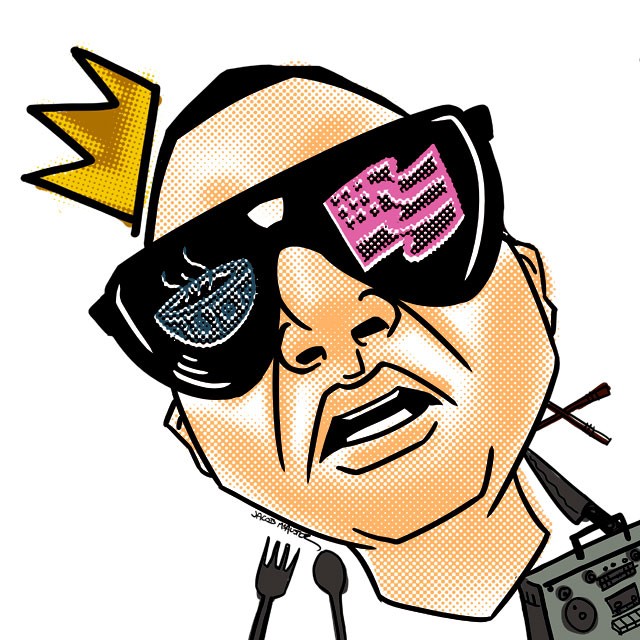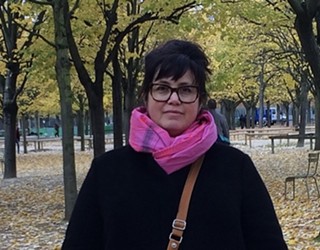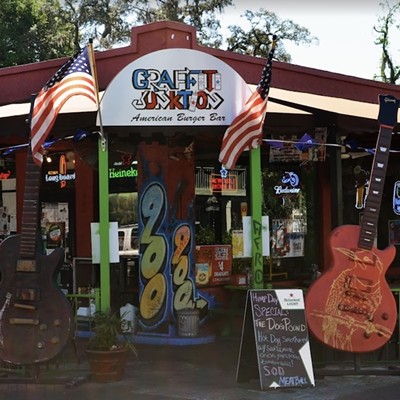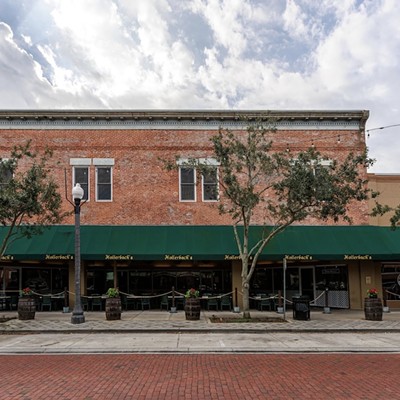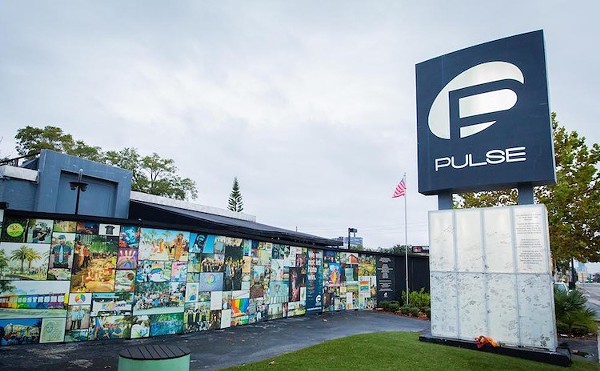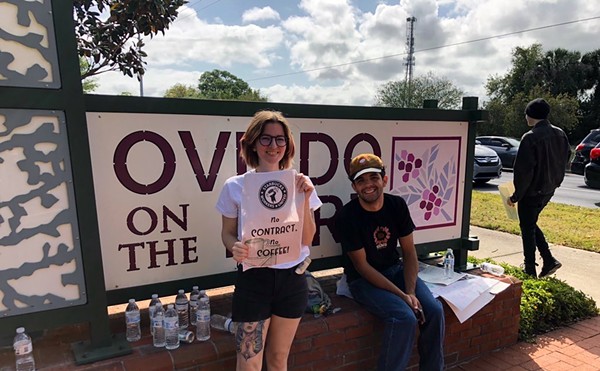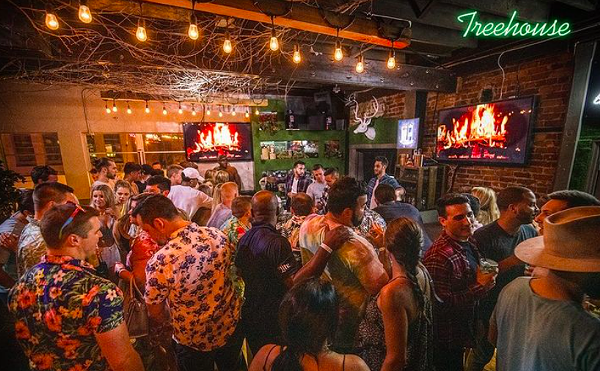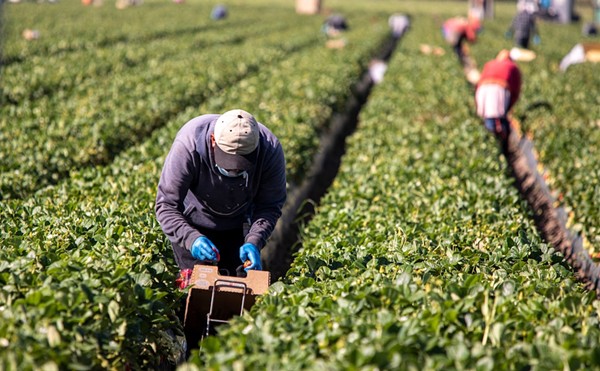I have this theory about why chefs are so popular right now. It's not just their function as middlemen facilitating the ascendancy of bacon in everyone's life. (Well, a little.) It's because in a world where elected officials are liars, bankers are thieves, and priests are … well … in a world where a suit is no longer a symbol of trustworthiness, a person who creates success with his hands is morally attractive.
A person who's more invested in telling his honest opinion than in shucking and jiving to become a celebrity is even more so – witness the success of Anthony Bourdain, who won't endorse a nonstick pan or a processed food if it means he can't call Sandra Lee's food "a crime against humanity" anymore. But Tony's mellowing a bit. He's got wives and offspring to provide for these days, and the returns on name-calling are slowing down for him.
This is where Eddie Huang comes in.
Huang, who grew up in Orlando, is a chef, writer, erstwhile lawyer, blogger and on-camera personality. Combining the superpowers of a ferocious work ethic, a fearsome vocabulary, humility in the face of failure, and a take-no-prisoners approach to other people's foolishness, Huang has launched himself into the public consciousness as a cartoony, Asianer-than-thou hell-raiser, labeling himself by turns Chairman Bao, the Chinkstronaut, Sars Blackmon or Kim Jong-Trill. He just can't seem to stop himself from talking smack where he sees the need: His righteous indignation over everything from Ethiopian chef Marcus Samuelsson's insufficient blackness to Asian-fusion media darling David Chang's culinary inauthenticity has found wide-throated expression in the last 18 months.
Eddiemania was already bubbling under when his second restaurant received, infamously, a zero-star review from the New York Times in October 2010. Huang had owned Baohaus, a mostly-takeout Chinese bun joint, since early 2010, and the stonerlicious Xiao Ye was his stab at a more ambitious menu and room. After he responded, not defensively (unlike Guy Fieri's recent bitchfest when the same thing happened to him) or angrily, but by basically agreeing with the reviewer that he wasn't ready for a full-service restaurant, his stardom kicked into a higher gear.
His memoir is titled Fresh off the Boat (Spiegel & Grau, 288 pages) – as are his blog (Fresh off the Boat) and his VICE web series. The book traces Huang's childhood in Orlando, growing up obsessed with food, basketball, hip-hop, weed, fighting and sneakers (not necessarily in that order). His parents were both born in Taiwan, making them, in Huang's extensive Chingrish-slang-and-reclaimed-slur lexicon, FOBs (fresh off the boat) and himself an ABC (American-born Chinese) – not the easiest roles to play in 1980s Orlando.
Fighting – often literally – against what he saw as an unfairly stacked deck, Huang struggled to find the correct outlet for his energies. He started a streetwear company (did well with Obama shirts in the 2008 race), graduated from law school and passed the bar (happy parents, and at least he can read his own contracts), tried his hand at stand-up comedy (stage name: Magic Dong Huang), competed on a Food Network TV show (Ultimate Recipe Showdown; called a co-competitor's dish "fucked-up kitchen-sink peanut sauce"), got a Cooking Channel show, Cheap Bites (lost it after trashing fellow Cooking Channel personality Anne Burrell on Twitter), and eventually opened Baohaus, serving Taiwanese steamed-bun sandwiches that melded his mother's cooking techniques with flavor combinations that met his own highly tuned standards. All the while he was blogging, tweeting, publishing essays anywhere he could, in his own inimitable patois: part Chingrish, part hip-hop, part eager undergrad, like some kind of Food Will Hunting.
Eddiemania is on blast now; it seems there's no media outlet he hasn't owned, from CNN to Forbes to the World Journal. As I write this, I'm listening to Huang's episode of Hooked Up, chef Tom Colicchio's fishing-and-eating web series, and I've got a browser-punishing number of tabs open to dozens of current profiles and interviews. On Tuesday, Feb. 26, Huang gave a four-minute speech at TED 2013. (This year's theme? "The Young. The Wise. The Undiscovered." Hardly.)
Clown him if you want for all of that early stuff – the TV show misfires, the stand-up, the DJ Ducksauce persona – that was just Huang cooking off the first. (To "cook off the first" is to flash-boil meat to get rid of any odor, blood, whatever; that liquid is then discarded and the process of slow-cooking and deeply flavoring the meat commences.) He's applying the principles of Taiwanese (and Southern) cooking to his life: Use what you have, and don't waste anything. Make it delicious.
A clue to where Huang's path may lead lies in an October 2010 blog post, when he wrote, "I'm interested in the culture of eating. I'm not a chef." Like Bourdain, whose career is no longer limited to cooking or even just talking about cooking, maybe the time Huang has spent in kitchens is just a springboard to launch him into a position where he can travel, eat, and write about traveling and eating.
In an email conversation, though, Huang says his only goal is to "go water-ski with naked models on my back like Branson." Hey, as Christopher Wallace (aka Biggie Smalls), another food-and-rhyme-obsessed outsider, once said, "Sky's the limit."
The Boat Stopped Here: Eddie In O-Town

"Every day, I got sent to school with Chinese lunch. … Every day it smelled like shit. … I didn't care about the smell, since it was all I knew, but no one wanted to sit with the stinky kid." (p.30)
Huang's entry into Orlando was a bumpy one. His first (public) school suited him OK, but when his parents transferred him to the private Baptist First Academy, Huang says, "That's when it all went down the shitter." The inevitable cultural conflicts ensued, though it wasn't strictly to do with being Chinese – any kid who didn't grow up going to Christian church is going to ask the kind of logic-based questions that really piss off a Bible-thumpin' teacher. Huang "just wants to be down," though (like any third-grader), so the first thing that had to go was his home-cooked lunches. His mom gave in and bought him Kid Cuisine and Juicy Juice, but when he still got called "Chink" in the lunchroom, that was it: He slammed another kid's arm in the microwave, launching the pattern of physical retaliation for racial slurs that repeated itself throughout his academic career.

"When the helmets and pads were on, for 60 minutes, I wasn't Chinese anymore. I was part of the team." (p.71)
Once that pattern was set, Huang ended up on a tour of Orlando schools, attending five in seven years. At Trinity Prep, he fell under the spell of organized football and under the wing of a sympathetic coach who didn't know quite what to do with him. Huang sees now that he was "a lil' shih tzu tryin' to run with the pit bulls" but at the time, he didn't care: "Instead of being singled out and laughed at for being Chinese, I was being laughed at for totally sucking at football. It was a relief."

"Restaurants were going up all over the place. … It was a theme-park and sunshine-fueled boomtown." (p.19)
Huang grew up in the restaurant business – his father, Louis Huang, is a tourist-area hospitality mogul. After starting out with the Atlantic Bay Seafood Grill, Huang's father went on to open Cattleman's Steakhouse on International Drive, still his most successful venture. Attempts to branch out into fine dining (Bola Ristorante) and move into downtown (Black Olive, Blue Smoke Burger Bar) didn't work out quite so well. At the leading edge of his celebrity in 2010, Eddie killed two birds with one stone, combining a holiday visit to the fam with a Baohaus pop-up at Cattleman's. Plans to do so again, if they exist, are being held close to the vest.

"Fire-red Jordan Vs with the lace locks. … The shits were so fresh, it was like having cars on your feet." (p.42)
Birth of an obsession: Huang first spied sneakers that made him understand "wanting to jack someone" on a middle-school basketball court. After begging his parents to take him to the Belz Outlet Mall to score his own pair, he got a hard lesson instead in how spending money can't make you someone you're not. Shoes are still uppermost, but he's become a connoisseur and moved on to the impossible-to-find: "The only shoes I still want are the [Nike] Union 180 and Galaxy Foamposites," he says now.

"I needed to get away … There was an individual inside me that wasn't Chinese, that wasn't American, that wasn't Orlando." (p.129)
When asked if he has plans for an Orlando Baohaus, Huang responds with characteristic bluntness: "Naw, I love my friends and family in Orlando, but it's a soulless place that really needs to get off Mickey's dick and create an independent identity. It's not healthy to be married to the Mouse."

"These guys figured something out … this sesame fried chicken was ethereal." (p.75)
Aside from his father's restaurants, Huang doesn't name-drop many Orlando eateries in Fresh off the Boat. Forbidden City is the exception; Huang says the sesame fried chicken from this takeout spot is the only food memory he has from seventh grade – although it's a backhanded compliment, as he continues, "There wasn't anything else worth eating there." However, he has kind words for a few O-town spots: "I still love Black Bean Deli for the pan con lechon. Tortilleria [la Mexicana, on Goldenrod Road] is amazing, and I like Cedar's in Dr. Phillips."

"When I told them I was going to Rollins College, they all started laughing." (p.163)
After a year at University of Pittsburgh, Huang returned to Orlando and transferred to Rollins College, which has a perhaps-not-totally-deserved rep for being the school of last resort for the cream of America: rich, white and thick. Within days he realized he could, ahem, make some money, so he "set up like Duane Reade on campus," dealing pharmaceuticals, Ecstasy and weed. (The book features pages of discussion of how and where to buy and deal drugs at Rollins, and just who was buying. You might think this would turn the Rollins PR department's hair white, but surprisingly enough, Huang is booked to give a lecture on campus March 19.) But he also got his mind opened at Rollins by gifted professors like Jennifer Henton, Jill Jones, Bill Boles and Maurice "Socky" O'Sullivan; Rollins' interdisciplinary approach allowed Huang to explore his intellectual appetites, and while in class, he says, he "saw a whole other life for himself."

"Cold steel on the back of my head. There's nothing that can prepare you for that feeling." (p.181)
There's brawling aplenty in the first half of the book; it feels like Huang's entire childhood/young adulthood was spent hitting or being hit (sometimes by his parents). Huang's predilection for fisticuffs racked him up two jail visits – once in high school for choking out a kid who had punched his brother in the face; the second time for general mayhem at a Rollins frat party. (The SWAT team showed up because the frat brothers believed Huang's crew's bluff about "going to get the gat.") "I was there [at the 33rd Street Jail] two days," says Huang. "Ate a lot of Beefaroni and Little Debbie's." That second arrest was the last straw for Huang's parents, but maybe the birth of the adult Eddie Huang. "The only trick they had left in their kung-fu manuals was to send the kid home to marinate" – home, in this case, being a semester in Taiwan. While in Taipei, Huang experienced food in a way he never had before, breaking down flavors and analyzing techniques. So, in a way, we have the 33rd Street Jail to thank for Baohaus.

"For the last 11 years of my life, my dad and I had read the Sentinel every morning. … It was the most important interview I'd ever have." (p.207)
In 2004, the Orlando Sentinel ran as an article a letter to the editor that Huang had submitted, and offered him an interview as a beat writer. Although what ensued might be open to interpretation – the editor took one look at Huang, said, "Oh wow, that face" and decided they wouldn't be able to "make this work" – Huang took it as yet another example of the racism that would force him to do his own thing, because "that face" would never be allowed on ESPN or in the newspaper.

"The Orlando Magic sucked. I thought their name was wack and there were mad cornballs on the team like Scott Skiles and Jeff Turner." (p.35)
Huang's only advice for the current Magic organization: "Keep trading white people like J.J. Redick, haha." I think maybe, just maybe, Huang might not have the Magic's best interests at heart.

